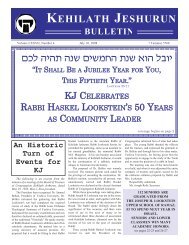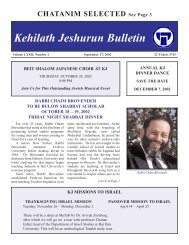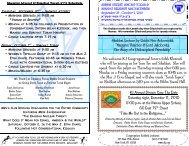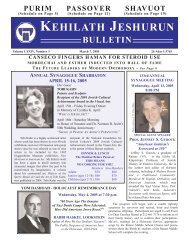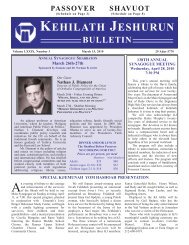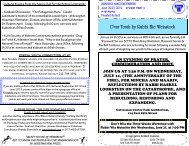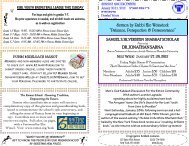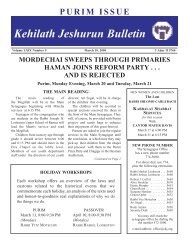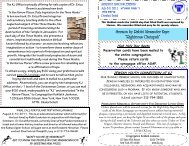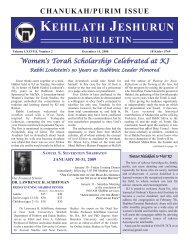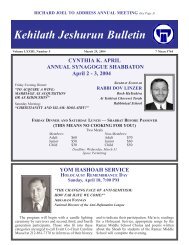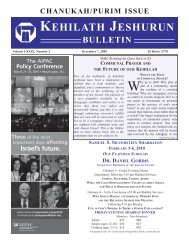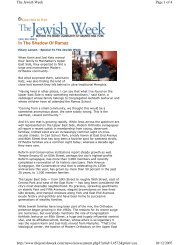Celebrating our 135th year of service - Congregation Kehilath ...
Celebrating our 135th year of service - Congregation Kehilath ...
Celebrating our 135th year of service - Congregation Kehilath ...
You also want an ePaper? Increase the reach of your titles
YUMPU automatically turns print PDFs into web optimized ePapers that Google loves.
Page 4 KEHILATH JESHURUN BULLETIN<br />
KETER TORAH AWARDS BESTOWED ON<br />
STACY SCHEINBERG AND DONNA SILVERMAN<br />
SHAVUOT II – June 3, 2006<br />
At the conclusion <strong>of</strong> the morning <strong>service</strong> on the second day <strong>of</strong> Shavuot, Stacy Scheinberg and Donna Silverman were presented<br />
by Rabbi Meir Soloveichik with the F<strong>our</strong>th Annual Judith Kaufman Hurwich Keter Torah Awards:<br />
Thank you so much for those very<br />
generous words, Rabbi; I am honored to be<br />
here today to receive this recognition,<br />
especially alongside Donna.<br />
I would like to <strong>of</strong>fer these remarks to<br />
express appreciation for the wonderful chesed<br />
opportunities <strong>our</strong> Rabbis, the Shul's<br />
administrators, as well as Rudy and his staff<br />
provide to this community. It is only because<br />
<strong>of</strong> their dedication that all <strong>of</strong> us are able to<br />
perform those acts for which Donna and I are<br />
being singled out today. I draw inspiration<br />
for these remarks from the bat-mitzvah<br />
parshiot <strong>of</strong> my two eldest daughters, Melissa<br />
and Carly. For their bat-mitzvahs, I<br />
chickened-out <strong>of</strong> making any speeches,<br />
instead I left that task to their father, Ron. I<br />
gather I don't have that option today.<br />
Carly and Melissa’s parshiot, Vayera and<br />
Achrei-Mot/Kiddoshim, speak to us in two<br />
very different ways. The first provides a<br />
narrative telling the tale <strong>of</strong> Abraham's sorrows<br />
and triumphs; the latter details the laws and<br />
rituals <strong>of</strong> holiness. Yet both Torah portions<br />
examine the theme <strong>of</strong> chesed. They show the<br />
importance <strong>of</strong> giving to the stranger: to the<br />
outsider, the lonely, and the oppressed. Both<br />
highlight the importance <strong>of</strong> acts <strong>of</strong> kindness to<br />
those within the immediate community as<br />
well as those outside <strong>of</strong> it. Even more so, they<br />
teach us how to give while preserving the selfrespect<br />
<strong>of</strong> the recipient-and in so doing, they<br />
present to us a model <strong>of</strong> giving guided by<br />
compassion and respect.<br />
Parshat Vayera, as you all know, opens<br />
with Abraham's exuberant invitation to three<br />
visitors to enter his tent. Though they seem<br />
content with little, agreeing to a meal <strong>of</strong> just<br />
bread and water, Abraham personally arranges<br />
for and serves them a grand feast. It is this<br />
willingness to go far beyond that which is<br />
expected that sets Abraham apart as a model<br />
<strong>of</strong> holiness. He attends to his guests’<br />
immediate needs for food, drink, and rest-and<br />
equally important, their emotional well-being.<br />
Abraham requests <strong>of</strong> them: “If now I have<br />
found favor in y<strong>our</strong> sight, do not pass, I pray,<br />
from y<strong>our</strong> servant.” As a Hebrew, an outsider<br />
himself, Abraham recognizes the<br />
psychological sensitivity <strong>of</strong> those who are<br />
KETER TORAH AWARD ADDRESS BY STACY SCHEINBERG<br />
different. He therefore seeks to put these<br />
visitors at ease by suggesting that these guests<br />
honor him by entering his tent. As j<strong>our</strong>neyers,<br />
as seekers, as beholders <strong>of</strong> the world,<br />
Abraham believes that they <strong>of</strong>fer him as much<br />
as they receive from him. His perspective<br />
upholds the dignity <strong>of</strong> those whom he is<br />
bound to serve.<br />
The intensity <strong>of</strong> Abraham’s hospitality to<br />
strangers, his devotion to haknasat orchim, is<br />
the role model par excellence <strong>of</strong> Donna’s<br />
Lunch and Learn program. Following the<br />
example <strong>of</strong> <strong>our</strong> patriarch, Donna is a person <strong>of</strong><br />
kindness who works tirelessly to welcome the<br />
elderly and add to their lives. Her Lunch and<br />
Learn program provides a wonderful meal, an<br />
interesting lecture, and last but not least, a<br />
spirit <strong>of</strong> comraderie and community. Those<br />
who once might have been strangers are<br />
warmly welcomed into <strong>our</strong> home. They join<br />
us as guests, and leave us as friends. Like<br />
Abraham, we open <strong>our</strong> homes and in this<br />
opening, gain as much as we give.<br />
I do want to add on a very personal note,<br />
that I did not grow up in an Orthodox home. I<br />
grew up in what could only be called a<br />
reformed Reform home. I managed to find<br />
my way to and marry, thank God, a Yeshiva<br />
boy who belonged to this Orthodox shul. I<br />
was the stranger that was welcomed into this<br />
great tent and for that I am forever grateful.<br />
My daughter Melissa’s bat mitzvah parsha<br />
was Parshat Acharei-Mot/Kiddoshim, a<br />
parsha chock full <strong>of</strong> rules and laws. One that<br />
I find quite stirring is found in Chapter 19,<br />
verses 9 and 10: “When you reap the harvest<br />
<strong>of</strong> y<strong>our</strong> lands, you should not reap all the way<br />
to the edges <strong>of</strong> y<strong>our</strong> field…you shall leave<br />
them for the poor and the stranger.” This<br />
commandment underscores the sacred<br />
obligation <strong>of</strong> giving with compassion and<br />
respect. As we designate the corners <strong>of</strong> the<br />
field ownerless, we allow the poor and the<br />
stranger to glean for themselves, so that the<br />
taking <strong>of</strong> food in no way diminishes their selfrespect.<br />
This notion <strong>of</strong> helping those in need<br />
while maintaining their dignity, <strong>of</strong> providing<br />
for them in a wise and caring way, is a value<br />
ingrained in <strong>our</strong> community. Whether helping<br />
Israeli merchants suffering from the Intifada<br />
or providing loans to struggling Israeli<br />
businesses, or sending buses to Washington to<br />
give voice to those who are helpless or<br />
oppressed, or even establishing a Kosher food<br />
pantry right here in <strong>our</strong> shul, THIS IS WHAT<br />
WE DO. KJ honors the spirit <strong>of</strong> the mitzvah<br />
actively: we not only supply assistance<br />
directly to the poor and needy, but we also<br />
provide the means by which they may<br />
someday help themselves.<br />
When I first approached Rabbi Lookstein<br />
with the idea <strong>of</strong> starting a food pantry, I was a<br />
bit nervous <strong>of</strong> his reaction. I went prepared<br />
with statistics on Jewish hunger and poverty,<br />
as well as articles on the subject…and quite a<br />
bit <strong>of</strong> apprehension. But when I broached the<br />
topic, he gave me a very simple “YES.” While<br />
discussing the nitty gritty details, there was<br />
only one remaining question I needed to ask,<br />
did he want the KJ Food Pantry to feed only<br />
Jewish people? “No,” he said, “only Hungry<br />
people.” All are equally welcome in <strong>our</strong> tents<br />
and <strong>our</strong> fields, in <strong>our</strong> homes and in <strong>our</strong><br />
community. As God reminds us in Exodus<br />
Chapter 23, verse 9, “And a stranger you will<br />
not oppress; for you know the heart <strong>of</strong> a<br />
stranger, seeing as you were strangers in the<br />
land <strong>of</strong> Egypt.” The obligation to preserve the<br />
life and dignity <strong>of</strong> the poor and the stranger is<br />
integral to who we are, and remains central to<br />
<strong>our</strong> striving for holiness.<br />
Every morning in <strong>our</strong> daily prayers, we<br />
declare that “these are the precepts that have<br />
no prescribed measure,” and we include<br />
hospitality to guests and leaving the cornerfield<br />
on <strong>our</strong> list. Indeed, these are the mitzvot<br />
that have no limit. They are the precepts that<br />
embrace chesed not only as a commandment,<br />
but as a way <strong>of</strong> life. These are the actions <strong>of</strong><br />
kindness that bind us together because <strong>of</strong><br />
shared compassion and respect. These are the<br />
principles that KJ represents.<br />
I am proud to be part <strong>of</strong> a <strong>Congregation</strong><br />
that is built upon these principles. Our honors<br />
today are in fact, honors to Rabbi Lookstein<br />
and this <strong>Congregation</strong>, who enable us to<br />
perform these acts with and on behalf <strong>of</strong> this<br />
wonderful community. Good Shabbos and<br />
Good Yom Tov.



